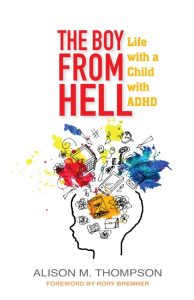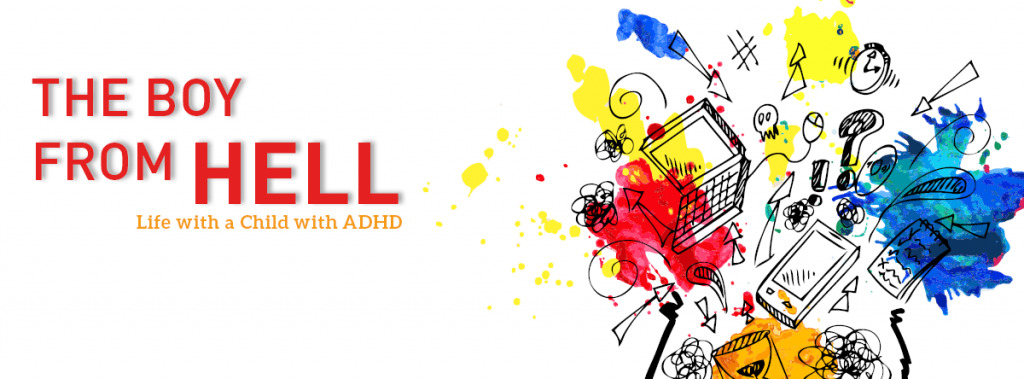We talked to Alison Thompson, mother and founder of ADHD Kids, about her parenting experiences and how they led her to write the candid account of life with an ADHD child, The Boy from Hell. She also offers advice to parents and teachers who care for children with ADHD.
- 1) Why did you decide to write this book?

When my son Daniel was first diagnosed with ADHD I read everything I could about the condition, but most of the books were American and the information they provided didn’t really seem to apply to me, as a mum in the UK. I often thought that a book written by someone just like me would be really useful. Roll forward ten years and I started a business, The Proof Fairy, offering proofreading and editing to self-publishing authors. Every time a new book came to me I found myself wishing it was me doing the writing – until one day I just decided the time had come for me to write a book of my own, and of course our ADHD journey was the obvious thing to write about.
- 2) What were some of the services and resources that you have found most helpful as a parent with a child who has ADHD?
To be honest we’ve really struggled to find support over the years. We were never offered any sort of support by our doctor or CAMHS, and the only parenting course I was told about wasn’t really suitable for kids with ADHD – we were pretty much left to our own devices! I did discover an online organisation called Adders; they had a forum that I was a member of, and it was really useful to be able to ask for advice or just rant in a place where other people knew what I was going through. Other than that, I used to get a lot of support from friends and family, and I read everything I could on the subject! Jacqui Jackson’s Multicoloured Mayhem was a huge source of comfort for me. Nowadays I think ADHD is more accepted and more known about and there are lots of support groups and online forums where parents can get help and advice.
- 3) What advice do you have for mainstream schools and teachers who work with children who have ADHD?
Kids with ADHD often struggle in school and as much as anything, it seems to be because of the lack of knowledge teachers have about the condition. Yet there are some really simple strategies they can put in place to help children with ADHD, without being detrimental to the rest of the class. For example, the popular group tables, where lots of kids all sit together, are a nightmare for ADHD kids because there are so many children around them to distract them! Also, while it’s lovely seeing classrooms decorated with brightly coloured posters and artwork, this again can be a huge source of distraction. Because ADHD is such a complex condition there are lots of other challenges associated with it apart from the typical hyperactivity, impulsivity and inattention, but schools don’t seem to realise this. For example, my son had huge issues with fine motor skills and found writing really difficult, which meant he either got frustrated and had a meltdown, or avoided writing altogether by messing in class. It took till he was in Year 3 for anyone to think about giving him a pen grip – and all of a sudden he was able to hold the pen properly and write! Simple things like this can make a big difference. The biggest issue, however, is that teachers often seem to think kids with ADHD are misbehaving deliberately, whereas it’s more often because they’ve forgotten what they are meant to be doing, or because they are trying to avoid doing things that they find difficult, or because they simply can’t control their behaviour. If teachers learn more about the condition and are more patient and understanding, everyone benefits.
- 4) Do you think it would be possible for children with ADHD to study in mainstream schools if extra support systems or services were put in place? And if so, what would this support look like?
Definitely – and lots of children do succeed in mainstream schools! As I said before, it’s all about understanding the condition – and understanding that because of the complexity of it, no two kids with ADHD will respond to the same strategies the same way. It’s about treating kids as individuals, using trial and error to find the strategies that work for each child, rather than treating everyone the same way. Equality isn’t about treating everyone equally, in my view; it’s about treating each individual in the way that works for them so they have an equally good chance of succeeding.
- 5) What words of advice do you have for parents who are considering medication for a child with ADHD?
I understand totally how scary the idea of medication is. Ritalin in particular gets a really bad press and no parent wants to give their child mind-altering drugs. I wasn’t sure about giving my son medication, but after trying exclusion diets and fish oil supplements and all sorts of other things I decided to give it a go, and it was probably the best thing we could have done. It’s important to understand that ADHD is a biological condition, just like asthma and epilepsy, for example. If your child had epilepsy you probably wouldn’t think twice about giving them medication to control their fits, so they could lead a normal life – so why should ADHD be any different? Medication gave my son the opportunity to slow down, concentrate and think, and that meant he was able to learn strategies to help him control his behaviour. He’s 18 now and hasn’t taken medication for two years, because he knows what his challenges are and he has developed ways to get around them. I don’t think he would be able to do that now if he hadn’t taken medication when he was younger.
- 6) It must have taken you a lot of determination and perseverance to raise Daniel. What were some of the more frustrating moments, and how did you manage to cope?
Someone once told me that I was “brave” to have raised Daniel, but that’s crazy – he’s my son, I love him, and I just got on with what needed to be got on with! But yes, it has been frustrating at times, and there were times when I felt like washing my hands of him and walking away – though of course I’d never actually do that. When he was in infant school I found it particularly difficult to manage because I was convinced there was something wrong but no one else believed me – not the doctor, not the school. In fact, the head teacher told me there was nothing wrong with Daniel except bad parenting! That really hurt – I was a single parent at the time and I was doing my very best to parent him properly, and his sister was the complete opposite of him- she was compliant, calm and a high achiever. Battling with the school and trying to get support for my child- when they were adamant that all his problems were down to my failings as a parent- was tough. I only really coped through having the unending support of my mum and a couple of friends. Friendships are hard to keep when you have a child with ADHD, and I’ve been very lucky to have a few loyal friends who stuck with me through everything. I was also “lucky” in that, as a single parent, I did get a break from the children when they went to visit their father. Having a few hours to myself was a complete lifesaver, and it’s something I recommend all parents do if at all possible. Even if it’s just an hour to have coffee with a friend, read a book, or have a relaxing bath – try and find time for yourself, because it will help keep you sane! And when parents feel calm and confident, they will have a calmer and more confident approach to their parenting, and it rubs off on their children too.
- 7) Meltdowns must have been particularly stressful and difficult to deal with emotionally. What are some of the techniques that you used to diffuse or contain these situations?
Meltdowns are definitely the biggest challenge of parenting a child with ADHD and I have to admit I haven’t always coped with them very well. Sometimes it was just easier to let Daniel have his own way rather than risk yet another meltdown, and looking back I wish I had been stricter with him at times. However, over time I learned that the best way to deal with meltdowns was to avoid them entirely - and that didn’t always mean giving in to Daniel. The key to managing meltdowns is to spot the signs that one is brewing. With Daniel, I knew when he was close to meltdown because he would go very pale, his body would become quite rigid and his mouth would become a single thin line. At that point I knew I had to do something – and fast! Sometimes changing the conversation made a difference – just completely dropping what we were talking about and throwing something totally random in. Occasionally I had a “meltdown” of my own and Daniel would be so shocked by the sight of me lying on the floor kicking and screaming he forgot what he was angry about! But usually, just walking away before he blows, letting him calm down, and then dealing with the situation later is a good move. It’s all about catching him at the right moment.
- 8) If you could give one piece of advice for parents or carers of a child or children with ADHD, what would it be?
Just one piece of advice? That’s difficult! But it would probably be to educate yourself about ADHD as much as you can. Learn as many strategies as you can and try them out, because some of them will work – it’s just a case of finding what works for your child. Understand what ADHD is about so you can deal with the people who try to tell you it’s not real. And never, ever blame yourself – ADHD isn’t about bad parenting, it’s just one of those things.
Find out more about Alison’s book here.

Reading this interview I feel life with my ADHD ODD son described. The self doubt, the judgement from others when medication is commenced after exclusion diet and fish oil tried, the battles over management with spouse, the isolation from those with ” good children”, the exhaustion….
My grandson is 18 as adhd we have more rows over things he not on meds no help from cams full stop no constration that’s very poor mood swings terrible so much so his parents did not want him